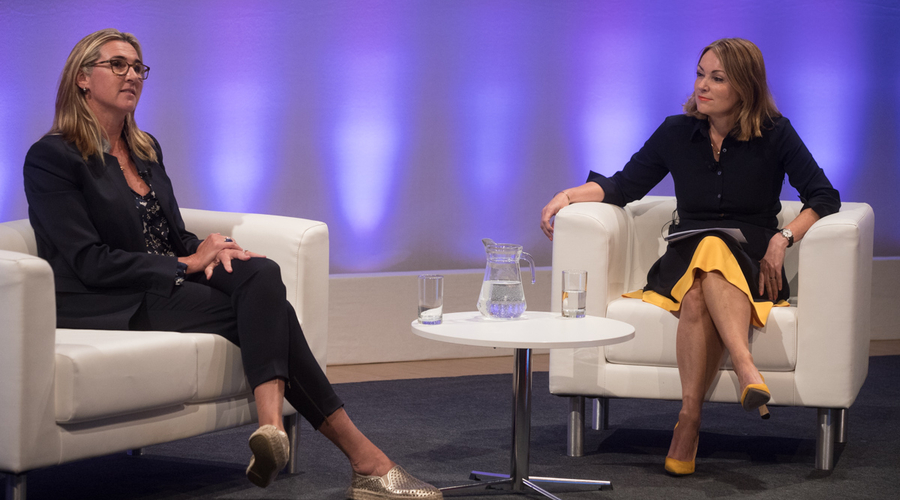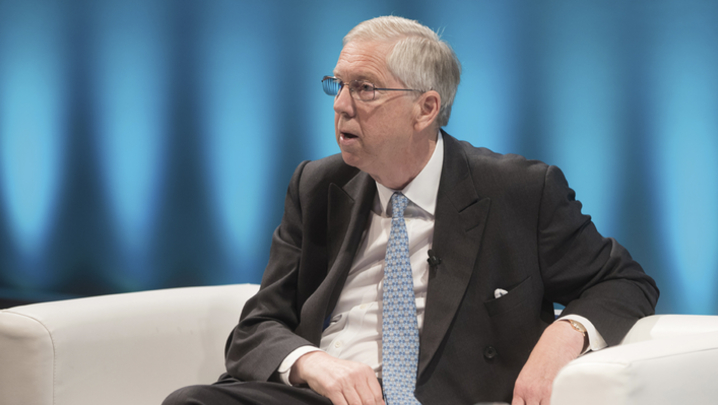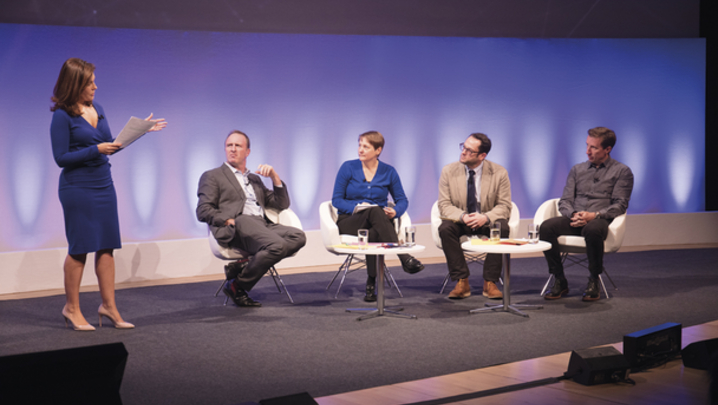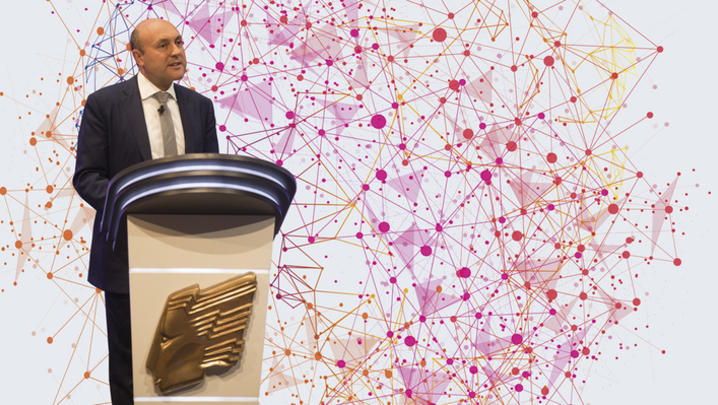CEO Nancy Dubuc explains how A+E Networks has prospered by taking risks and diversifying. Matthew Bell watches the showreel
A+E Networks has successfully reinvented itself as a producer of original global content. Giving the international keynote address at the RTS Convention, President and CEO Nancy Dubuc explained how the US media giant had moved into new broadcasting territory.
In 2002, A+E lost the rights to reruns of the long-running police procedural Law & Order. This was a big blow, because the network had been pulling in huge audiences on the back of the crime show.
“We had no choice but to reinvent the model for ourselves, and that began [the move] into original programming,” explained Dubuc.
Fifteen years later, A+E – a 50:50 joint venture between Hearst Communications and DisneyABC Television Group – has become a hugely successful global operator. Its channels, which include History, Lifetime, FYI (formerly the Biography Channel) and Viceland, reach 360 million households in more than 200 territories.
Its resurgence has been partly fuelled by original non-scripted shows, which the session chair, Channel 4’s Jay Hunt, described as “very punchy for the American market. They almost speak to a British tradition of public service broadcasting, [covering] big issues of the day”.
The documentary series Intervention, which follows the lives of addicts, has been running since 2005. “[The show] was one of the three times I have been told I may lose my job,” recalled Dubuc, who has worked at A+E for more than 14 years – the past four as CEO.
The other two programmes for which Dubuc put her job on the line, she revealed, were A+E IndieFilms’s Jesus Camp, about an evangelical Christian community, and The Kennedys, which was pulled from History in the US.
Many suspected the demise of The Kennedys was more because of the unflattering light the mini-series shone on the American political dynasty than its supposed historical inaccuracies.
“It’s my job as the creative and business leader of the company to push people outside of their comfort zone,” said Dubuc, adding that these “risky” shows were motivated by a desire to hold up a mirror to society.
Cop documentary Live PD, which follows US police forces on the streets on a Friday night and is shown live, has proved a ratings winner for A+E since its debut last October.
British producers approaching A+E with programme ideas, said Dubuc, should “not come to my team with a 2.0 version of what we already have”.
She continued: “Being the first show out there takes a lot of guts; being the 15th version of that [show] is a business model.”
In her approach to programme-making, Dubuc maintained that “celebrating failure is key”. She explained: “Half of what we do fails, at least – and that’s a pretty good batting average, actually, if half of what you do works. You’ll get fired for doing nothing; you won’t get fired for a show not working.”
Audience data, she said, “can point you in the right direction of a topic that might work, but it isn’t going to tell a story”. Moreover, she said, “We don’t aspire to own the information; we aspire to own the hearts of our customers.”
Dubuc said that A+E had been trying “to get away from the repeat business” and, “in primetime, we’re pushing our premieres”, such as Live PD.
But, pointed out Hunt, there was “increasingly massive inflation in non-scripted and reality. So, to populate a channel with a much higher percentage of origination is a bankrupting proposition, isn’t it?”
Dubuc rejected this argument, maintaining that A+E had a good balance of genres and programming.
A+E launched an in-house scripted production division, A+E Studios, in 2013. Notable series produced so far include History’s Roots and Lifetime drama Unreal.
International markets are another area earmarked for investment. “It is a huge area of focus and growth for us as a company,” said Dubuc. Here in Britain, A+E Networks UK is a joint venture between A+E and Sky.
Despite reports to the contrary, Dubuc denied that she was pulling back from the relationship with Sky.
In 2014, A+E took a stake in Vice Media, before launching the millennials’ TV channel, Viceland, two years later. Dubuc claimed it had been a success: “It is talking to an audience that doesn’t watch any television – but I would argue that we were not giving that audience much television to watch.
“We were there at the birth of cable [TV in the US], and I watched that first video on MTV, and all of cable felt like it was made for us. [But] it has aged with us and we didn’t do a great job of listening to the generation coming up behind – we need to reinvent ourselves for what they care about.”
Variety is key, argued Dubuc: “I don’t ever want to be known for just one genre. It’s very important for us to diversify, whether that’s non-fiction documentary, live or scripted – that’s what’s been our saviour all these years, being able to zig while others zag.”
Looking to the future, which she said would be “constantly” changing, Dubuc mainained that she would continue to use “fail-fast” business practices.
This required “looking at the decisions we make” and, if they were not working, “having the courage” to change tack. “Admitting failure is hard for people,” she said, “but I do believe that [it’s necessary].”
‘Session Two: International keynote’ featured Nancy Dubuc, President and CEO, A+E Networks, who was interviewed by Channel 4 chief creative officer Jay Hunt. The session was produced by Helen Scott.
Standing up to the streamers
Subscription video-on-demand services (SVoD) – most prominently Netflix, Hulu and Amazon Prime – are changing the way we watch TV.
So, how is A+E Networks responding to this challenge?
A+E, in contrast to many broadcasters, doesn’t license its programmes to Netflix. "Netflix has an incredible business and I think all of us are a bit envious of what it has and what it is able to spend," said A+E’s boss, Nancy Dubuc.
Until a few years ago, the network had a library arrangement with Netflix, but she said that the money it received ‘wasn’t worth the risk that we’re taking of creating a behaviour to not watch commercial television’.
She added: "We’ve done more piecemeal deals with Amazon and we have a better relationship with Hulu [on] hours of programming, because 75% of the audience that’s watching on Hulu is still watching the commercials.
"So, for me, it’s about the audience behaviour – we all watch SVoD and things without commercials but we all also tolerate commercials in some environments because you care about that brand or that show.
"You care enough about it that you will stick with it. We don’t want to become [just] “good enough”, so that [people] will tolerate watching two-seasons-ago content because it’s available on a service that doesn’t have commercials.
"[We want] a “go-seek-it-out” [attitude from viewers] because 'I love History or I love those Lifetime movies and I know I can’t get them anywhere else'.
"It’s not that we don’t want to work with those [SVoD] companies, but, on a library basis, the maths doesn’t work."







